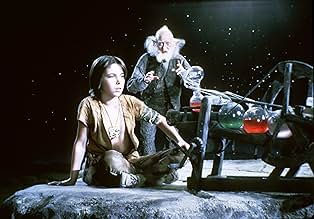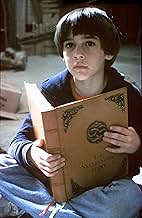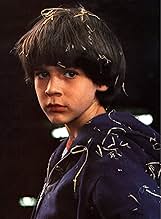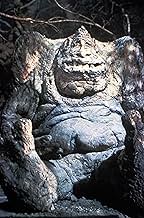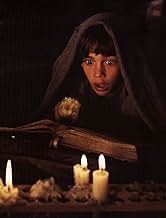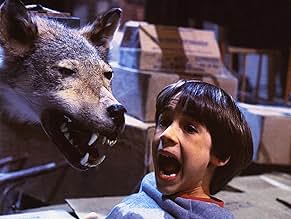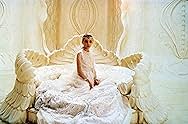Un jeune garçon trouve un livre merveilleux qui le fait entrer dans un monde de fantaisie à chaque lecture.Un jeune garçon trouve un livre merveilleux qui le fait entrer dans un monde de fantaisie à chaque lecture.Un jeune garçon trouve un livre merveilleux qui le fait entrer dans un monde de fantaisie à chaque lecture.
- Prix
- 5 victoires et 9 nominations au total
Chris Eastman
- 1st Bully
- (as Drum Garrett)
Beth Anderson
- The 2nd Balladeer
- (voice)
- (uncredited)
Donald Arthur
- School's Caretaker
- (uncredited)
Willie Coppen
- Fantasia Inhabitant
- (uncredited)
Bernd Eichinger
- Man next to Man Who Drops Milk
- (uncredited)
Dee Harris
- The Balladeers' Lead Guitarist
- (uncredited)
Histoire
Le saviez-vous
- AnecdotesWith a budget of 50 million Deutsche Mark (about $27,000,000), this was the most expensive film ever produced in Germany at the time.
- GaffesIn the scene where Falcor delivers Atreyu to Engywook & Urgl, Atreyu is clearly much larger than the small, old couple. Later, when Engywook and Urgl are standing on/near Falcor they they are about the same size as Atreyu in relation to Falcor.
- Citations
Rock Biter: They look like big, good, strong hands, don't they? I always thought that's what they were.
- Autres versionsThe Warner Bros. Pictures logo and it's closing Saul Bass variant are both plastered with the 1992 variant in the DVD version, and 2003 variant in the Blu-ray version.
- Bandes originalesThe Neverending Story
Music by Giorgio Moroder
Lyrics by Keith Forsey
Performed by Limahl Feat. Beth Anderson (uncredited)
Guitar solo Dee Harris (uncredited)
Courtesy of EMI Records, Ltd.
Commentaire en vedette
This film was a favorite of mine as a kid, but even back then I recognized that the book by Michael Ende was superior. Overall, it's a wonderful children's film marred by an inconsistent tone and an unsatisfying ending.
No fantasy film I've seen has tapped more successfully into the kinds of philosophical thoughts that kids have. Think of Rockbiter's speech describing the Nothing: "A hole would be something. Nah, this was nothing. And it got bigger, and bigger, and bigger...." This is the type of film that greatly appeals to introspective kids who think about things like infinity and the end of the universe. Do children really think about such things? I did. People who find that surprising have forgotten how profound children can sometimes be.
The whole of Fantasia, indeed, seems to be built out of children's dreams and fears. Some of it is about exhilaration, as when Atreyu rides Falkor. Others reflect anxiety, as in Atreyu's trek through the Swamps of Sadness. What appealed to me most as a kid was how an imaginative but passive child, sort of a young Walter Mitty, opens up a book in which an older, braver version of himself goes on adventures. But "Neverending Story" isn't so much escapism as it is about escapism. It's essentially a fable about the destruction of a child's fantasy world as he grows older and adapts to the modern world.
The special effects are good for their day. Although they look phony at a few points, the film's distinct visual look, from the shimmering Ivory Tower to the assortment of weird creatures, holds up well today. What makes the film work especially well is that the two child stars--Barret Oliver and Noah Hathaway--prove themselves capable actors. I use the word "capable" because almost everyone in the film overacts in an annoying way, which I blame primarily on the director. But there's a wonderful cameo by Gerald McRaney as Bastian's father. He has the perfect tone for the scene, appearing loving but distant, unable to fathom Bastian's mind. I wish the film had followed through by returning to their relationship at the end and exploring how Bastian changes as a result of his experiences in Fantasia.
The reason the ending doesn't work is obvious to anyone who's read the book. Simply put, the movie shows only the first half of the book! While this isn't the movie's fault entirely--there was no way the entire story could have fit into one movie--this could have been handled better. "The Wizard of Oz" faced the same problem yet managed not only to become one of the greatest fantasy movies of all time but to surpass its source material in some ways. "The Neverending Story" doesn't accomplish that feat. The story feels unresolved at the end while at the same time failing to clearly set up for a sequel. It attempts to wrap everything up with a sequence in which Bastian takes revenge on his old bullies. I enjoyed this scene when I was a kid, but in retrospect it creates a clash between the real world and the fantasy world. Bastian never grows as a character, he never learns to put his feet on the ground, something the early scenes suggest will happen.
There's one other problem, and that's that Wolfgang Petersen never really figured out the proper tone for a children's movie. He must not have had a clear idea what age he was shooting for. Some of the scenes are quite scary and violent, making this film inappropriate for younger children. Yet the muppet-like characters are presented in an annoyingly condescending way that I doubt older kids (not to mention teens and adults) would appreciate. For example, the first scene in Fantasia plays like a revival of Sesame Street, with Rockbiter filling the Cookie Monster role. By the time I was old enough to appreciate the deeper aspects of the story, I cringed at the film's cutesy moments. Petersen didn't have to direct the film this way. Had he shot for a wider age group, the result would have been fresher and more authentic for everyone.
No fantasy film I've seen has tapped more successfully into the kinds of philosophical thoughts that kids have. Think of Rockbiter's speech describing the Nothing: "A hole would be something. Nah, this was nothing. And it got bigger, and bigger, and bigger...." This is the type of film that greatly appeals to introspective kids who think about things like infinity and the end of the universe. Do children really think about such things? I did. People who find that surprising have forgotten how profound children can sometimes be.
The whole of Fantasia, indeed, seems to be built out of children's dreams and fears. Some of it is about exhilaration, as when Atreyu rides Falkor. Others reflect anxiety, as in Atreyu's trek through the Swamps of Sadness. What appealed to me most as a kid was how an imaginative but passive child, sort of a young Walter Mitty, opens up a book in which an older, braver version of himself goes on adventures. But "Neverending Story" isn't so much escapism as it is about escapism. It's essentially a fable about the destruction of a child's fantasy world as he grows older and adapts to the modern world.
The special effects are good for their day. Although they look phony at a few points, the film's distinct visual look, from the shimmering Ivory Tower to the assortment of weird creatures, holds up well today. What makes the film work especially well is that the two child stars--Barret Oliver and Noah Hathaway--prove themselves capable actors. I use the word "capable" because almost everyone in the film overacts in an annoying way, which I blame primarily on the director. But there's a wonderful cameo by Gerald McRaney as Bastian's father. He has the perfect tone for the scene, appearing loving but distant, unable to fathom Bastian's mind. I wish the film had followed through by returning to their relationship at the end and exploring how Bastian changes as a result of his experiences in Fantasia.
The reason the ending doesn't work is obvious to anyone who's read the book. Simply put, the movie shows only the first half of the book! While this isn't the movie's fault entirely--there was no way the entire story could have fit into one movie--this could have been handled better. "The Wizard of Oz" faced the same problem yet managed not only to become one of the greatest fantasy movies of all time but to surpass its source material in some ways. "The Neverending Story" doesn't accomplish that feat. The story feels unresolved at the end while at the same time failing to clearly set up for a sequel. It attempts to wrap everything up with a sequence in which Bastian takes revenge on his old bullies. I enjoyed this scene when I was a kid, but in retrospect it creates a clash between the real world and the fantasy world. Bastian never grows as a character, he never learns to put his feet on the ground, something the early scenes suggest will happen.
There's one other problem, and that's that Wolfgang Petersen never really figured out the proper tone for a children's movie. He must not have had a clear idea what age he was shooting for. Some of the scenes are quite scary and violent, making this film inappropriate for younger children. Yet the muppet-like characters are presented in an annoyingly condescending way that I doubt older kids (not to mention teens and adults) would appreciate. For example, the first scene in Fantasia plays like a revival of Sesame Street, with Rockbiter filling the Cookie Monster role. By the time I was old enough to appreciate the deeper aspects of the story, I cringed at the film's cutesy moments. Petersen didn't have to direct the film this way. Had he shot for a wider age group, the result would have been fresher and more authentic for everyone.
- kylopod
- 14 oct. 2005
- Lien permanent
Meilleurs choix
Connectez-vous pour évaluer et surveiller les recommandations personnalisées
- How long is The NeverEnding Story?Propulsé par Alexa
Détails
- Date de sortie
- Pays d’origine
- Langue
- Aussi connu sous le nom de
- L'histoire sans fin
- Lieux de tournage
- Blood Alley, Gastown, Vancouver, Colombie-Britannique, Canada(alley that Bastian is chased into)
- sociétés de production
- Consultez plus de crédits d'entreprise sur IMDbPro
Box-office
- Budget
- 27 000 000 $ US (estimation)
- Brut – États-Unis et Canada
- 20 192 381 $ US
- Fin de semaine d'ouverture – États-Unis et Canada
- 4 325 823 $ US
- 22 juill. 1984
- Brut – à l'échelle mondiale
- 20 288 595 $ US
- Durée1 heure 42 minutes
- Couleur
- Rapport de forme
- 2.35 : 1
Contribuer à cette page
Suggérer une modification ou ajouter du contenu manquant

Lacune principale
By what name was The Neverending Story (1984) officially released in Canada in English?
Répondre






